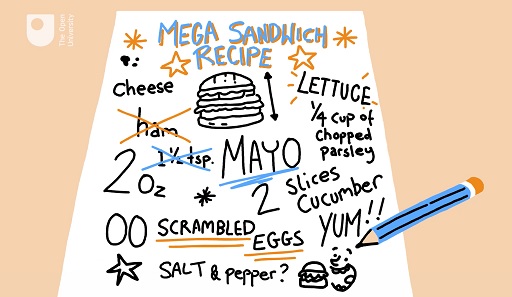Session 3: Writing
Introduction
Writing tasks come in many different forms, from straightforward notes and messages to complicated reports, study assignments and job applications. Each has its own rules of language and layout, but they all involve writing.
It’s a bit like preparing food. Boiling an egg is different from making pizza, but both are cooking tasks.
Recipes reflect this. Fish curry tastes quite different to chocolate mousse but recipes for the two dishes are structured in similar ways:
- Both start with a list of ingredients.
- Both note the equipment needed.
- Both break the method down into a series of steps.
- Both allow you to create a successful dish.

Transcript
If you are doing this course to prepare you for either the Functional Skills English Level 2 qualification or the Essential Skills Wales Communication Level 2 qualification, remember that writing is an important part of both programmes.
For the Functional Skills English Level 2 qualification, the writing assessment consists of two writing tasks, which involve writing a formal letter, email, report or blog. You get marks for your ability to write in the correct style and format, as well as for the accuracy of your spelling, punctuation and grammar.
For the Essential Skills Wales Communication Level 2 qualification, you are asked in the controlled task to write two documents that communicate different information to different audiences using language that is appropriate to purpose and audience. You are asked to write in different styles and produce different types of text. This could include, but is not limited to, a formal letter, email, report, article or blog.
You need to have evidence that you can plan, draft and proofread your work. Your final pieces of writing should reflect your ability to write in the correct style and format, using accurate spelling, punctuation and grammar for the level.
